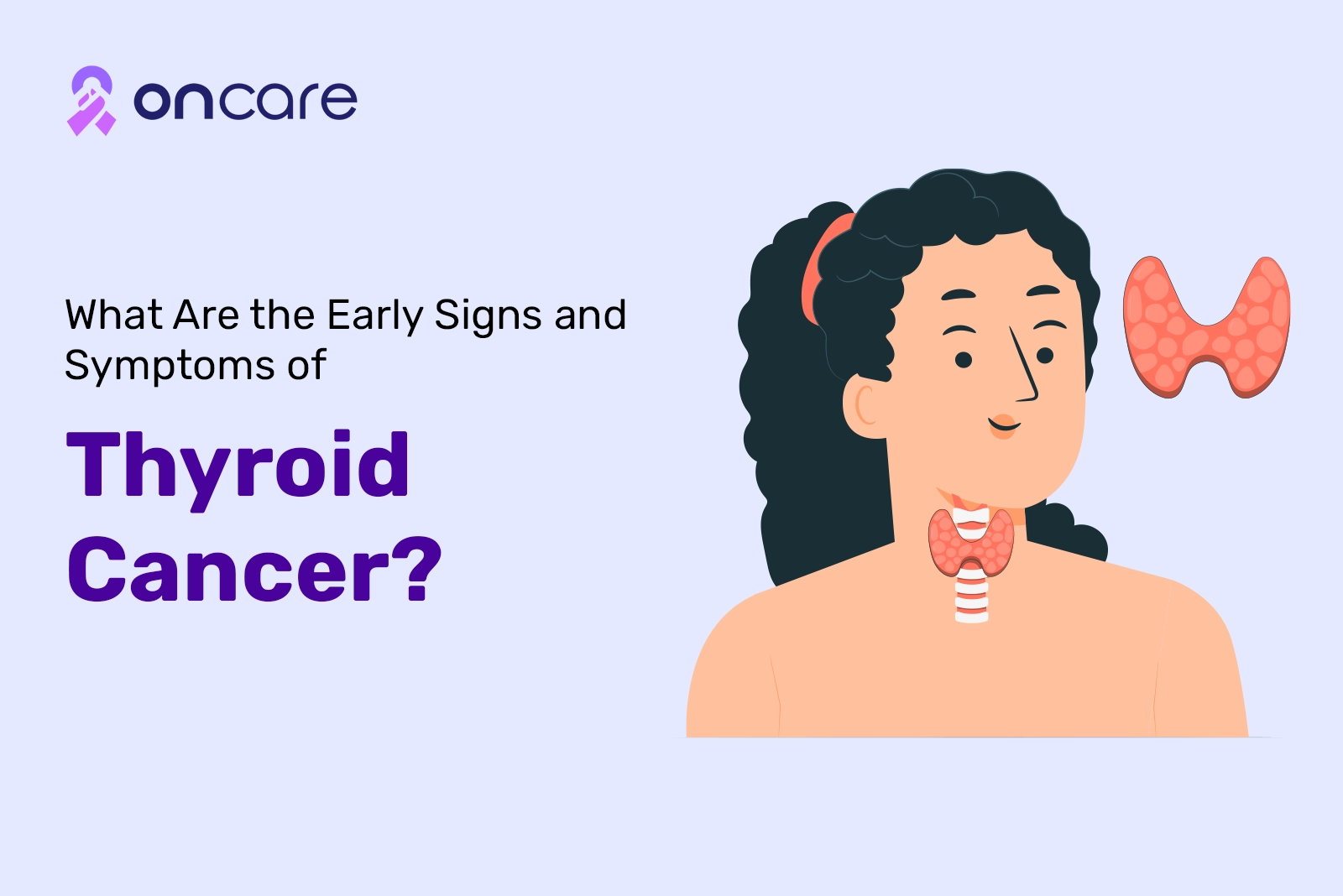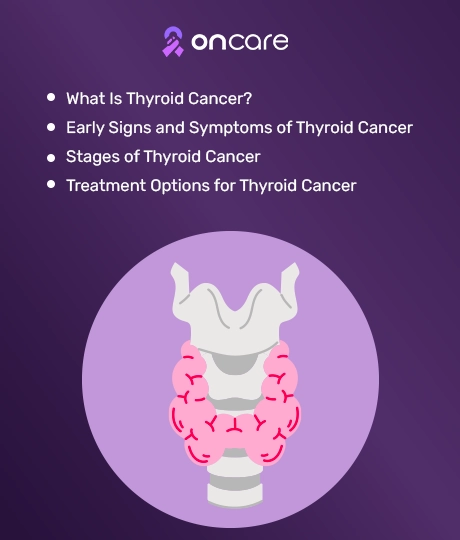What Are the Early Signs and Symptoms of Thyroid Cancer?

Early detection of thyroid cancer disease significantly improves treatment outcomes. This condition arises in the thyroid gland and is marked by symptoms such as neck lumps, hoarseness, and swallowing difficulties. Understanding the signs of cancer is crucial for timely intervention. At Oncare, we specialize in offering affordable and comprehensive thyroid cancer treatment, ensuring every patient receives expert care. Our services include 40% cost-saving surgery plans, advanced therapies, and discounted insurance options, making quality care accessible.
Learn about thyroid cancer, its symptoms, stages, and treatments to safeguard your health and take the first step toward recovery with Oncare's dedicated team.
What Is Thyroid Cancer?
Thyroid cancer is a type of cancer that begins in the thyroid gland, a butterfly-shaped gland located at the base of the neck, just below the Adam’s apple. This gland is part of the endocrine system and plays a vital role in producing hormones that regulate metabolism, heart rate, body temperature, and calcium levels in the blood. Thyroid cancer occurs when the cells in the thyroid undergo genetic mutations, causing them to grow uncontrollably and form a mass or tumour.
There are four primary types of thyroid cancer:
Papillary Thyroid Cancer
Papillary thyroid cancer (PTC) is the most common form, making up about 80% of all thyroid cancer cases. It typically develops in the cells that produce thyroid hormones and tends to grow slowly. While it often remains confined to the thyroid or nearby lymph nodes, it has a high survival rate, especially when diagnosed early. PTC is more common in women and often affects people between the ages of 30 and 50.
Follicular Thyroid Cancer
Follicular thyroid cancer (FTC) accounts for around 10-15% of thyroid cancer cases and is more likely to spread to distant organs, including the lungs and bones, via the bloodstream. It develops in the thyroid’s follicular cells and is often linked to iodine deficiency. While it’s generally treatable, FTC can be more challenging to detect in its early stages compared to other forms of thyroid cancer.
Medullary Thyroid Cancer (MTC)
Medullary thyroid cancer originates in the C cells of the thyroid gland, which produce calcitonin. It accounts for about 3-5% of thyroid cancer cases and is frequently linked to genetic conditions such as Multiple Endocrine Neoplasia (MEN) syndrome. MTC can be harder to detect in its early stages, as it doesn’t always cause noticeable symptoms until it has spread. It tends to be more aggressive than papillary and follicular types.
Anaplastic Thyroid Cancer
Anaplastic thyroid cancer (ATC) is a rare and highly aggressive form of thyroid cancer, making up less than 2% of cases. It typically develops in older individuals and grows rapidly, often spreading to surrounding tissues and other organs. Due to its aggressive nature, anaplastic thyroid cancer is difficult to treat, with poor survival rates, especially when diagnosed at advanced stages. It is often resistant to standard therapies like surgery and radiation.
For the most accurate diagnosis of your condition, consult our expert oncologists at Oncare. We provide the best care that will be best suited for your thyroid cancer type.

Early Signs and Symptoms of Thyroid Cancer
Thyroid cancer often begins with subtle or non-specific symptoms, making early detection challenging. However, recognizing these early signs of cancer can lead to more effective treatment outcomes. The following are the most common early signs and symptoms of cancer in thyroid:
Lump or Nodule in the Neck
The most noticeable early sign of thyroid cancer is the presence of a lump or nodule in the neck, which may feel firm and non-painful. In many cases, this nodule is discovered during a routine physical examination or by the patient during self-checks. Although most thyroid nodules are benign, a lump that persists or grows over time should be evaluated by a healthcare provider.
Hoarseness or Voice Changes
Hoarseness or a change in voice quality, often mistaken for a common cold or other throat infections, can be an early indicator of thyroid cancer. If the vocal cords are affected by the tumour, hoarseness may persist for weeks or months and worsen over time. This symptom can be linked to thyroid tumours pressing on the laryngeal nerve, which controls vocal cord function.
Difficulty Swallowing (Dysphagia)
As thyroid tumours grow, they may interfere with the oesophagus, leading to difficulty swallowing. This symptom can manifest as a sensation of food getting stuck in the throat or a painful swallowing experience. It’s often reported when cancer has progressed to a more advanced stage, but it can sometimes be an early sign if the tumour presses on the oesophagus.
Neck or Throat Pain
Pain in the neck or throat is another common symptom, though it may be subtle at first. The pain might radiate to the ears and worsen with swallowing or when pressure is applied to the neck. In some cases, this pain could be indicative of metastasis to surrounding lymph nodes or tissues, especially in advanced stages of thyroid cancer.
Swollen Lymph Nodes
Lymph node enlargement in the neck is a typical sign that thyroid cancer may have spread. Swollen lymph nodes can indicate metastasis or the body’s attempt to fight cancer. Lymph node involvement can occur early in the disease, particularly in papillary and medullary thyroid cancers. Enlarged lymph nodes may feel firm and immovable.
Persistent Cough
A dry, persistent cough that is not linked to any other respiratory condition may be a sign of thyroid cancer. This symptom can result from the tumour pressing on the windpipe (trachea) or oesophagus, leading to irritation in the throat and airway. Unlike a typical cough, this one is often non-productive and can last for several weeks or months.
Breathing Difficulty
Difficulty breathing or shortness of breath may arise as a result of the tumour pressing against the trachea or other respiratory structures. This is a more severe symptom, often occurring when the cancer has spread or is located near critical airway structures.
Unexplained Weight Loss or Fatigue
Although not as common as other cancer disease symptoms, unexplained weight loss and fatigue can sometimes occur in the early stages of thyroid cancer. These systemic symptoms may not be specific to thyroid cancer but can result from the body's response to cancer growth or an imbalance in thyroid hormone levels due to the cancer’s impact on the thyroid gland.
If you’re experiencing any of these symptoms, consult your condition with our oncologists and undergo the right course of thyroid cancer treatment.
Stages of Thyroid Cancer
Thyroid cancer progresses through distinct stages, each with specific characteristics that guide treatment decisions. The stages range from localized growth confined to the thyroid gland to advanced cases with widespread metastasis. We at Oncare ensure accurate staging so that our oncologists can tailor treatment plans, ensuring the most effective approach for each patient.
The key stages of thyroid cancer are:
Stage 1: Early Localized Cancer
In stage 1, the tumour is confined to the thyroid and typically measures less than 2 cm. There is no evidence of cancer spreading to nearby tissues or lymph nodes. This early stage has a high cure rate with treatment. Radioactive iodine therapy is often used after surgery to destroy any remaining thyroid tissue or microscopic cancer cells that may be left behind. The success of this therapy is very high at this stage, often leading to long-term remission.
Stage 2: Tumor Growth and Spread
At this stage, the cancer has grown but is still contained within the thyroid gland. The tumour may be larger than 2 cm but has not yet spread to surrounding structures or distant organs. Treatment options are similar to stage 1, with surgery being the primary option, followed by radioactive iodine therapy to ensure all cancerous cells are eradicated. While the prognosis is still good, the need for close monitoring increases as the tumour continues to grow.
Stage 3: Locally Advanced Cancer
In stage 3, cancer may have spread to nearby lymph nodes or structures such as the trachea, larynx, or oesophagus. The tumour may be large or located in a way that complicates surgery. Treatment typically involves a combination of surgery, radioactive iodine therapy, and possibly external beam radiation therapy to target any remaining cancer cells. The cancer and thyroid become more closely linked in treatment discussions, as managing both the local disease and preventing future metastasis is critical.
Stage 4: Advanced or Metastatic Cancer
At stage 4, thyroid cancer has spread beyond the thyroid gland to distant areas such as the lungs, bones, or liver. Treatment for stage 4 often involves a combination of aggressive therapies, including surgery, radioactive iodine therapy, and external beam radiation. In some cases, targeted therapies or chemotherapy may be recommended, particularly for anaplastic thyroid cancer, which is more resistant to traditional treatments. The goal is to manage the disease, alleviate symptoms, and extend survival. Early detection and intervention remain crucial, as the prognosis can significantly improve with the right approach.
Treatment Options for Thyroid Cancer
At Oncare, the treatment options for thyroid cancer are tailored based on the type and stage of the disease. For early-stage thyroid cancer, surgery is the primary treatment, where our oncologists partially or completely remove the thyroid gland, depending on the extent of the tumour. Post-surgery, radioactive iodine therapy is commonly used to target and eliminate any remaining cancerous cells, especially in papillary and follicular thyroid cancers.
For more advanced cases or when surgery is not viable, our oncologists use targeted therapy drugs like Lenvatinib and Sorafenib to inhibit cancer cell growth. Chemotherapy is typically reserved for rare and aggressive forms, such as anaplastic thyroid cancer. However, consistent monitoring for recurrence is crucial, as thyroid carcinoma symptoms can reappear even after treatment.
Conclusion
Understanding the early signs of cancer and thyroid involvement is crucial for effective treatment. The sooner you detect the signs of thyroid cancer, the easier it will be to treat the condition and take preventive measures to stop the cancer from spreading, growing, or returning.
Are you feeling overwhelmed? Do not worry. Oncare’s expert team is here to guide you every step of the way.
With advanced treatment options like radioactive iodine therapy, affordable surgery plans, and personalized care, Oncare is committed to making your cancer and thyroid treatment journey as smooth as possible.
Frequently Asked Questions (FAQs)
Initially, thyroid cancer may be asymptomatic or present as a painless lump in the neck. Other signs include hoarseness and swallowing difficulties.
A slow-growing, painless neck lump is the silent warning of thyroid cancer. It may go unnoticed until the advanced stages.
If you witness symptoms like neck lump, persistent hoarseness, difficulty swallowing, swollen lymph nodes, neck pain, breathing issues, and persistent cough, you need to get checked for thyroid cancer.
Checking yourself for thyroid cancer is pretty simple. Use your fingers to feel for lumps around the thyroid area or look for swelling while swallowing water in front of a mirror. Consult Oncare specialists to discuss your condition and undergo thorough evaluations.
Stage 1 is an early stage where the tumour is confined to the thyroid gland (< 2 cm). The prognosis is excellent with proper treatment.
Most thyroid cancer types, especially papillary and follicular, are curable with early detection and treatment.
Elevated TSH levels may signal thyroid abnormalities, but they are not definitive for cancer. Our experts provide precise diagnosis and guidance.
Pain is often localized to the neck and may radiate to the ears or throat.
Thyroid pain typically occurs at the front of the neck and can be aggravated by swallowing.
Throat cancer symptoms include persistent hoarseness, difficulty swallowing, sore throat, and a lump in the neck.





